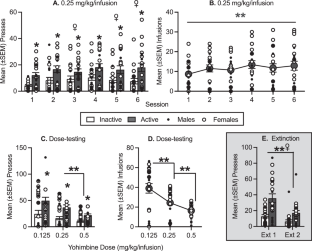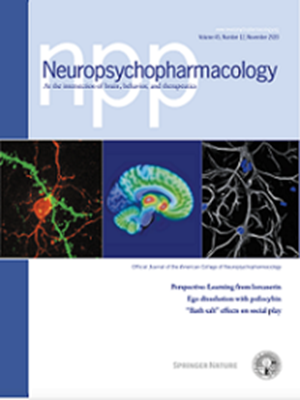致焦虑药物育亨宾是雌雄大鼠的强化剂
IF 6.6
1区 医学
Q1 NEUROSCIENCES
引用次数: 0
摘要
吲哚生物碱育亨宾是一种致焦虑药物,可激活大脑中的应激反应系统。然而,由于育亨宾也会诱发接近行为,因此本研究采用了雄性和雌性斯普拉格-道利大鼠来探索其潜在的强化效应。因此,首先要确定的是,静脉注射育亨宾(0.25 毫克/千克/次)是否能维持杠杆按压,摄入量是否会受到剂量/注射量的调节,以及在没有育亨宾或育亨宾配对线索的情况下,杠杆按压是否会持续。接下来,为了评估育亨宾对记忆巩固的影响,在训练后使用对象识别记忆任务给药 0.3、1.25 或 3 毫克/千克育亨宾。最后,场所条件反射评估了提高血清皮质酮水平的育亨宾剂量(1.25或3毫克/千克)是否能引起条件性场所偏好。结果发现,雌雄动物都能获得育亨宾静脉自我给药,摄入量受剂量/输注的调节,在消退过程中和没有育亨宾配对线索的情况下,杠杆按压仍能持续。此外,训练后注射 1.25 毫克/千克育亨宾可增强物体记忆的巩固,1.25 毫克和 3 毫克/千克育亨宾可提高皮质酮水平,并引起两性的地点偏好。最后,在对精神运动功能的行为测试中,急性育亨宾可增加对视觉线索的杠杆按压,并提高运动活动。这些发现揭示了育亨宾的行为效应特征,与精神兴奋剂强化药物的行为效应特征一致。本文章由计算机程序翻译,如有差异,请以英文原文为准。


The anxiogenic drug yohimbine is a reinforcer in male and female rats
The indole alkaloid yohimbine is an anxiogenic drug that activates stress-responsive systems in the brain. However, because yohimbine also elicits approach behaviors, this study employed male and female Sprague-Dawley rats to explore its potential reinforcing effects. Thus, it was first determined if intravenous (IV) infusions of yohimbine (0.25 mg/kg/infusion) could maintain lever pressing, whether intake could be modulated by dose/infusion, and if lever pressing would persist in the absence of yohimbine or yohimbine-paired cues. Next, to assess yohimbine’s effect on memory consolidation, 0.3, 1.25 or 3 mg/kg yohimbine was administered post-training using an object recognition memory task. Finally, place conditioning assessed whether doses of yohimbine that elevate blood serum corticosterone levels (1.25 or 3 mg/kg) could elicit a conditioned place preference. It was found that both sexes acquired yohimbine IV self-administration, that intake was modulated by dose/infusion, and that lever pressing persisted during extinction and in the absence of the yohimbine-paired cue. As well, post-training injections of 1.25 mg/kg yohimbine enhanced consolidation of object memory, and 1.25 and 3 mg/kg elevated corticosterone levels and elicited a place preference in both sexes. Finally, in behavioral tests of psychomotor functions, acute yohimbine increased lever pressing for a visual cue and elevated locomotor activity. These findings reveal a profile of yohimbine’s behavioral effects that is consistent with that of psychostimulant reinforcing drugs.
求助全文
通过发布文献求助,成功后即可免费获取论文全文。
去求助
来源期刊

Neuropsychopharmacology
医学-精神病学
CiteScore
15.00
自引率
2.60%
发文量
240
审稿时长
2 months
期刊介绍:
Neuropsychopharmacology is a reputable international scientific journal that serves as the official publication of the American College of Neuropsychopharmacology (ACNP). The journal's primary focus is on research that enhances our knowledge of the brain and behavior, with a particular emphasis on the molecular, cellular, physiological, and psychological aspects of substances that affect the central nervous system (CNS). It also aims to identify new molecular targets for the development of future drugs.
The journal prioritizes original research reports, but it also welcomes mini-reviews and perspectives, which are often solicited by the editorial office. These types of articles provide valuable insights and syntheses of current research trends and future directions in the field of neuroscience and pharmacology.
 求助内容:
求助内容: 应助结果提醒方式:
应助结果提醒方式:


